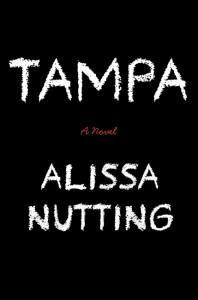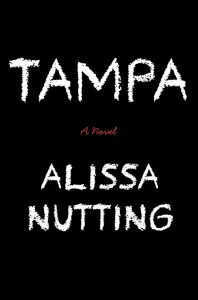An Interview with Alissa Nutting
Alissa Nutting is the author of Tampa, a novel, and Unclean Jobs for Women and Girls, a collection of short stories. Both are spectacular. Today, Alissa had a conversation with me about her new novel, how it was written, how it has been received so far, and the weird, scary, ugly mess that is American sexuality. It was great: you can and maybe should watch it. But regardless, you should buy and read her books.
Tampa by Alissa Nutting
 Tampa
Tampa
by Alissa Nutting
Ecco, July 2013
263 pages / $25.99 Buy from Amazon or IndieBound
Page 0
Tampa is covered in fur. Cheap fur. Velour almost, but even cheaper. Even though Tampa, amazingly, is a hardback book. It’s the dust jacket that is covered in rough-to-the-touch synthetic fuzz.
Except for the title, which is scrawled into it in white like chalk scratched across a blackboard. A fantastical blackboard. A sexy blackboard.
Page 2
We all know what Tampa is about. There have been reviews. (A lot of them, encouragingly, for a younger writer whose first collection came out from Starcherone.) And if we didn’t read those or the flap, the narrator tells us right away: in marrying her husband,
I hoped his wealth might provide me with a distraction, but this backfired—it left me with no unfulfilled urges except the sexual. I could feel my screaming libido clawing at the ornately papered walls of our gated suburban home.
Celeste’s sole sexual urge is for teenage boys, a crystallization of her first sexual experience and the immortality it implied. We find out immediately that her entire career path—middle school teacher—has been focused around fulfilling that urge.
There is no coquettishness here. No clever lead-up to the announcement of her particular obsession. The book is about one thing and one thing only: the wholehearted pursuit of sex with 14 year-old boys.
Page 28
Celeste is as systematic as she is direct. This grates, at first. Her character appears one-dimensional. The plot appears to mine for shock value without much at all to say. I wondered, after a bit of this, how closely this depiction came to Nutting’s real-life inspiration for the story (and Nutting’s high school classmate) Debra LaFave, or any of the other cases that came out around the same time across the country. Did these sex offenders set out so consciously and feverishly to do what they did? Does any mind work so singularly?
Page 80
But the readerly experience subsumes all of this. By page 40 I had found myself entering into an almost meditative state: Celeste masturbates furiously on her classroom desk; Celeste stalks her ideal student; Celeste keeps Jack after class and interrogates him about his sexual history. The book begins to feel like a thought-experiment in how long narrative can run on the fuel of a single motivation. And it works: the smut of it runs together into a bizarre, relieving, single-minded stream. Once we become sure we will have no last-minute changes of intention, no inward ethical dilemmas, we can sit on Celeste’s shoulder as she describes in exacting detail the steps through which she goes to secure Jack’s compliance in an affair. By page 80 I was so fully in Celeste’s mind that I wrote in the margins: “Am I crazy? Obsessive? Unfit for the world?”
READ MORE >
August 19th, 2013 / 11:00 am
Monstrous Women: An Interview with Alissa Nutting
 I learned about Alissa Nutting’s debut novel when I put together some half-baked thoughts on Amazon’s purchase of GoodReads. I came across the Book Page for Tampa and noticed that there were a lot of really weird reviews. One said the book was “ too explicit, too graphic, and too weird…to finish;” another said, “I don’t think women will read this for a thrill, especially anyone with school-aged sons.”
I learned about Alissa Nutting’s debut novel when I put together some half-baked thoughts on Amazon’s purchase of GoodReads. I came across the Book Page for Tampa and noticed that there were a lot of really weird reviews. One said the book was “ too explicit, too graphic, and too weird…to finish;” another said, “I don’t think women will read this for a thrill, especially anyone with school-aged sons.”
These reviews weren’t surprising–people have weird responses to sex. People have even weirder responses to stories about young female teachers who seduce their barely-pubescent students (and yeah, that’s sort-of-but-not-really the plot of Tampa). But still, I was not happy about these reviews, even before I read the book. I didn’t know Alissa then, but I knew her work well enough to know that she would not write a book like this just to be a sensationalist.
Tampa is not a book about pedophilia–it’s bold, sharp critique of the unreasonable expectations and the myopic judgments that contemporary women face on a day-to-day basis. The subject matter may be shocking, harrowing, and morally repulsive, but what makes Tampa so important is that this isn’t really satire. This stuff (and the ridiculous conversations around each instance) happens every day.
I don’t want to reveal more because I think you should read this book. I think you should react to it, and think about why you’re reacting to it. I think it’ll teach you something about the way you think about women.
Alissa deserves thoughtful responses to her work, because this book is really damn good. I wanted to talk to her about some things—about her intentions, her process, and her fears. I’m really grateful to know Alissa now.
MC: What made you want to write Tampa?
AN: I primarily devote myself to female characters, and I’m drawn toward topics that evoke social discussion. One of my areas of interest is monstrosity, and I was very aware that there aren’t many novels that follow a predatory female protagonist–especially a female sexual predator. Women are tasked with the social role of nurturer, so it’s taboo for them to perform any act of violence that isn’t protective or defensive. But it’s doubly taboo if that violence is sexual and the victim is male. As a society, we aren’t simply conditioned to accept males as victims of sexual violence perpetrated by females. This book is meant to challenge and engage that blind spot.
